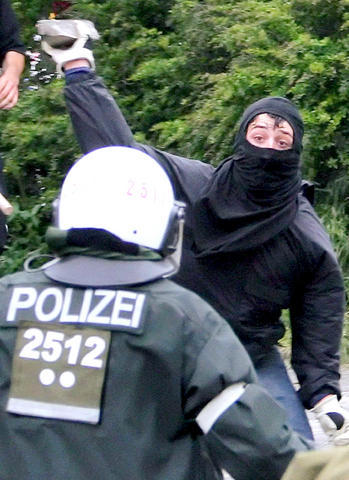Protesters with black hoods and bandanas covering their faces showered police with rocks and beer bottles before the heavily armored officers drove them back with water cannon and tear gas during a rally against an upcoming G8 summit.
Black smoke from burning cars mingled with the sting of tear gas in the harbor-front area of the northern German town of Rostock on Saturday, where tens of thousands of people had gathered peacefully at the start of the day. The clashes broke out among hundreds of stone-throwing demonstrators and police on the edges of the crowd as the rally progressed.
Some 146 police were hurt, 25 of them seriously. Police said they made 17 arrests.

PHOTO: EPA
It was an unruly start to what is expected to be a week of rallies against the three-day G8 summit beginning on Wednesday in the fenced-off coastal resort of Heiligendamm, 22km from Rostock.
German Chancellor Angela Merkel will host the leaders of Britain, France, Japan, Italy, Russia, Canada and the US for discussions on global warming, aid to Africa and the global economy. The summit, like past ones, is attracting protesters opposed to capitalism, globalization, the war in Iraq and the G8 itself.
Police have surrounded the summit site with a fence topped with barbed wire and closed the surrounding waters and airspace, fearing terrorism or disorderly protests like the ones that marred a 2001 summit in Genoa, Italy, where police and protesters clashed for days and one demonstrator was killed. Protests near the fence have been banned.
In Rostock, the officially permitted demonstration began peacefully on Saturday with two groups of marchers gathering at the waterfront. Clashes broke out near the end of the scheduled four-hour rally, as some people pried up paving stones and broke them into smaller pieces.
Eventually, five large green police trucks with twin water cannons mounted on top moved in to blast the rioters. A police car was destroyed and several parked cars burned, spreading black smoke over the area.
Police spokesman Frank Scheulen estimated the number of violence-minded demonstrators at about 2,000. Police put the size of the demonstration at 25,000, while organizers said it was 80,000.
Werner Raetz, anti-globalization activist with Attac, one of the organizing groups, distanced himself from the violence.
"There is no justification for these attacks," he said.
As for the demonstrations planned over the next few days, Raetz said both sides should try to get the "emotional situation" under control.
There are several camps in the area for protesters, and marches and other events are planned. Some protesters say they intend to try to block roads leading to the summit site.
Peter Mueller, who was among the demonstrators, had tears streaming from bloodshot eyes after the tear gas was released.
"As long as the police were in the background it was OK, but as soon as one took a step closer, it went out of control," he said. "What can you do? So ends the peaceful protest."
The protest was organized by several dozen groups under the motto "another world is possible."
Also see story:
Bush catches Europe off guard

Auschwitz survivor Eva Schloss, the stepsister of teenage diarist Anne Frank and a tireless educator about the horrors of the Holocaust, has died. She was 96. The Anne Frank Trust UK, of which Schloss was honorary president, said she died on Saturday in London, where she lived. Britain’s King Charles III said he was “privileged and proud” to have known Schloss, who cofounded the charitable trust to help young people challenge prejudice. “The horrors that she endured as a young woman are impossible to comprehend and yet she devoted the rest of her life to overcoming hatred and prejudice, promoting kindness, courage, understanding

‘DISRESPECTFUL’: Katie Miller, the wife of Trump’s most influential adviser, drew ire by posting an image of Greenland in the colors of the US flag, captioning it ‘SOON’ US President Donald Trump on Sunday doubled down on his claim that Greenland should become part of the US, despite calls by the Danish prime minister to stop “threatening” the territory. Washington’s military intervention in Venezuela has reignited fears for Greenland, which Trump has repeatedly said he wants to annex, given its strategic location in the arctic. While aboard Air Force One en route to Washington, Trump reiterated the goal. “We need Greenland from the standpoint of national security, and Denmark is not going to be able to do it,” he said in response to a reporter’s question. “We’ll worry about Greenland in

PERILOUS JOURNEY: Over just a matter of days last month, about 1,600 Afghans who were at risk of perishing due to the cold weather were rescued in the mountains Habibullah set off from his home in western Afghanistan determined to find work in Iran, only for the 15-year-old to freeze to death while walking across the mountainous frontier. “He was forced to go, to bring food for the family,” his mother, Mah Jan, said at her mud home in Ghunjan village. “We have no food to eat, we have no clothes to wear. The house in which I live has no electricity, no water. I have no proper window, nothing to burn for heating,” she added, clutching a photograph of her son. Habibullah was one of at least 18 migrants who died

Russia early yesterday bombarded Ukraine, killing two people in the Kyiv region, authorities said on the eve of a diplomatic summit in France. A nationwide siren was issued just after midnight, while Ukraine’s military said air defenses were operating in several places. In the capital, a private medical facility caught fire as a result of the Russian strikes, killing one person and wounding three others, the State Emergency Service of Kyiv said. It released images of rescuers removing people on stretchers from a gutted building. Another pre-dawn attack on the neighboring city of Fastiv killed one man in his 70s, Kyiv Governor Mykola